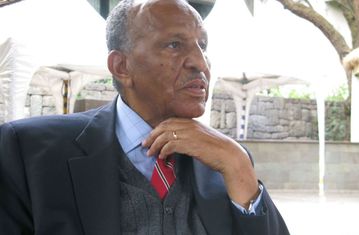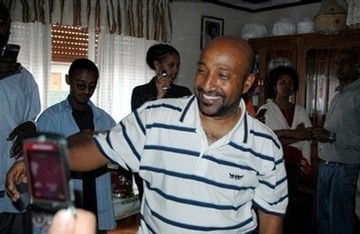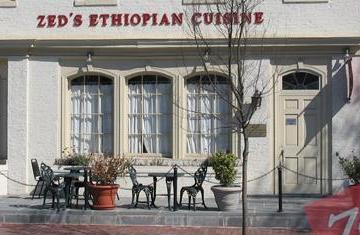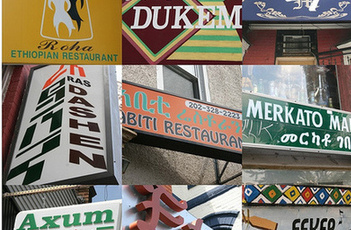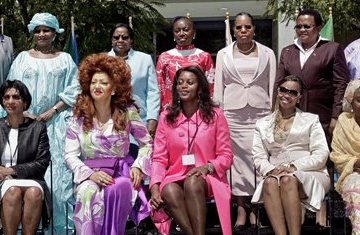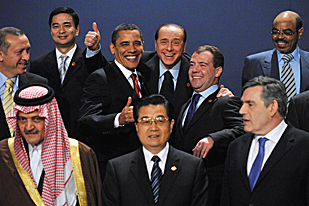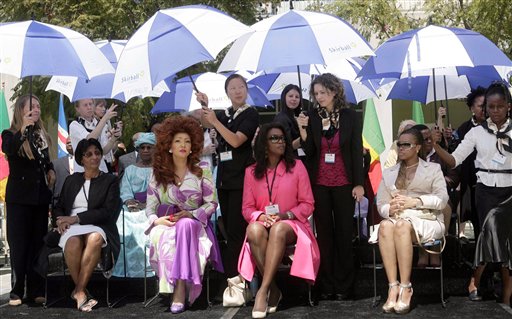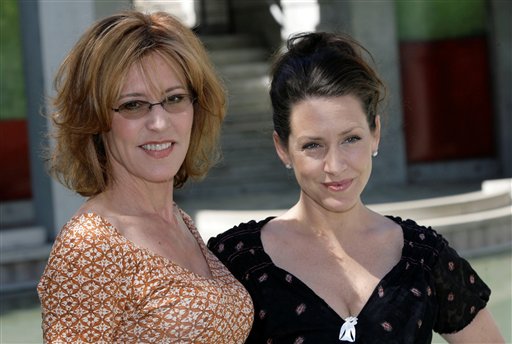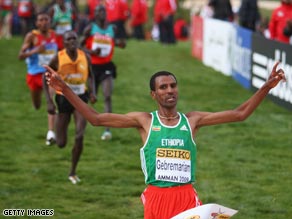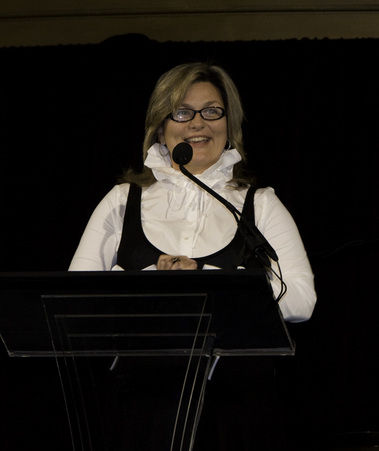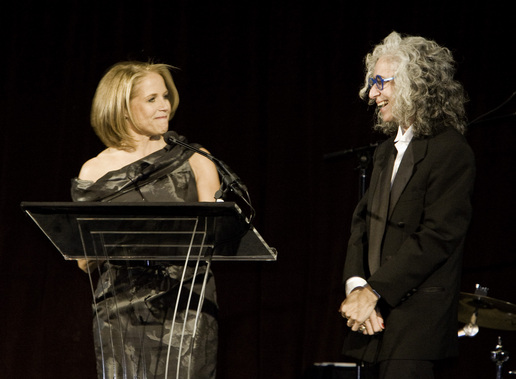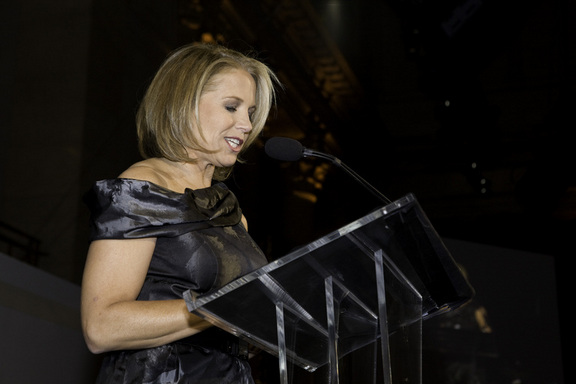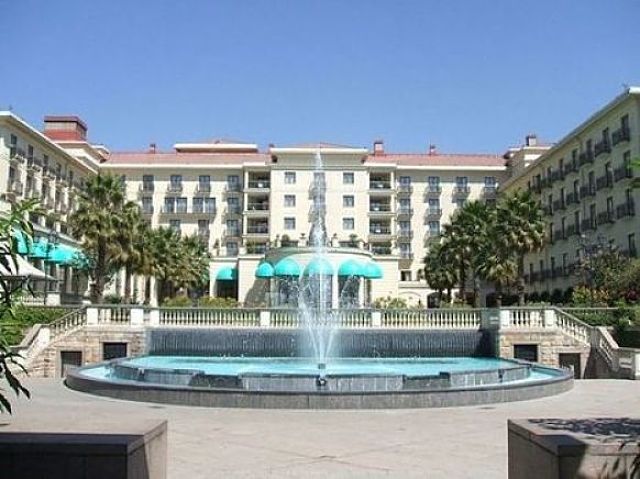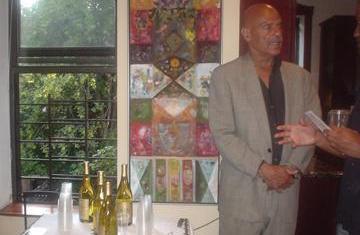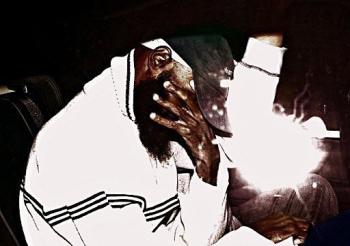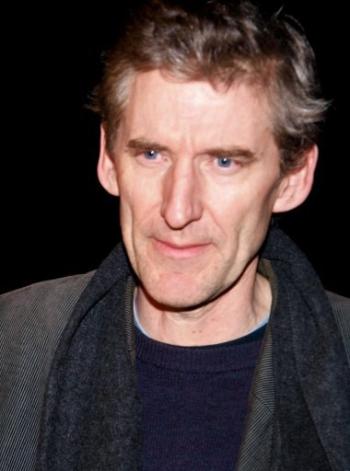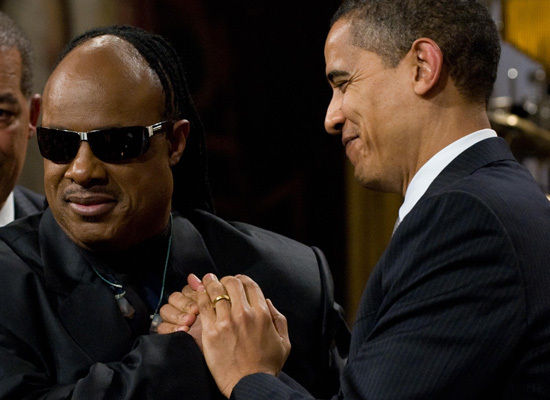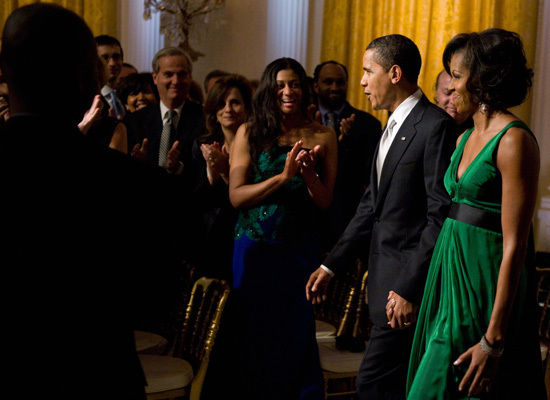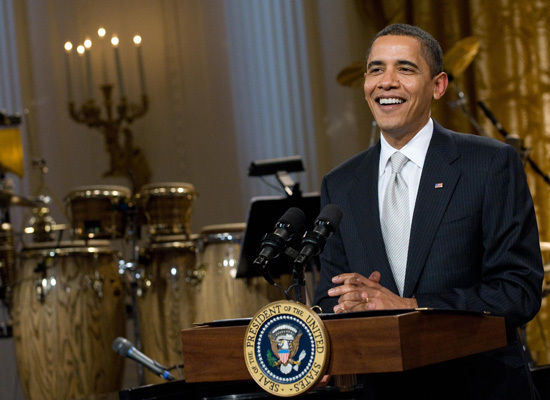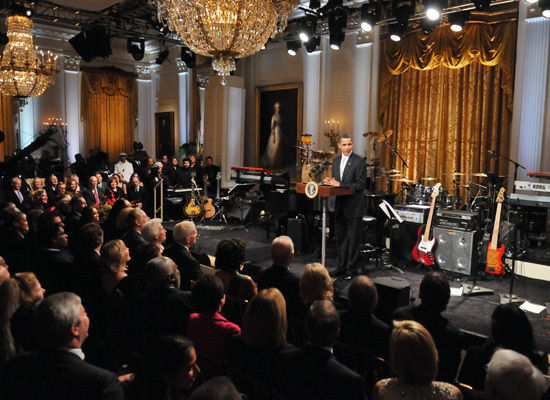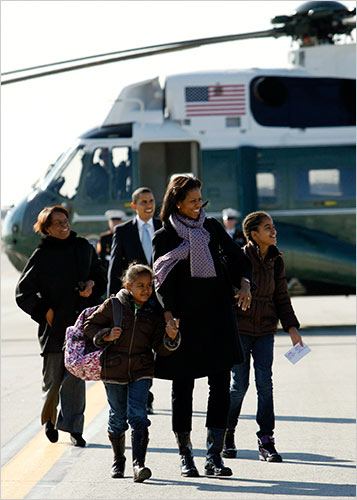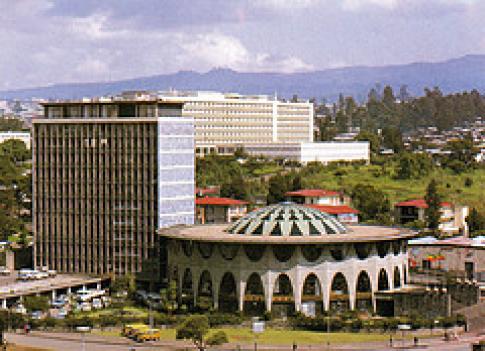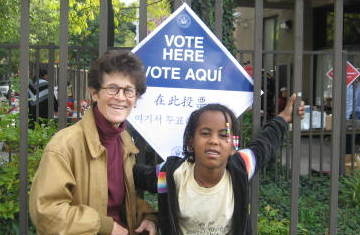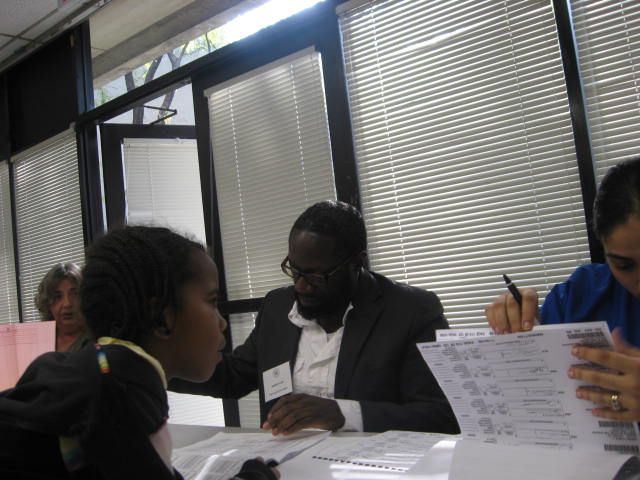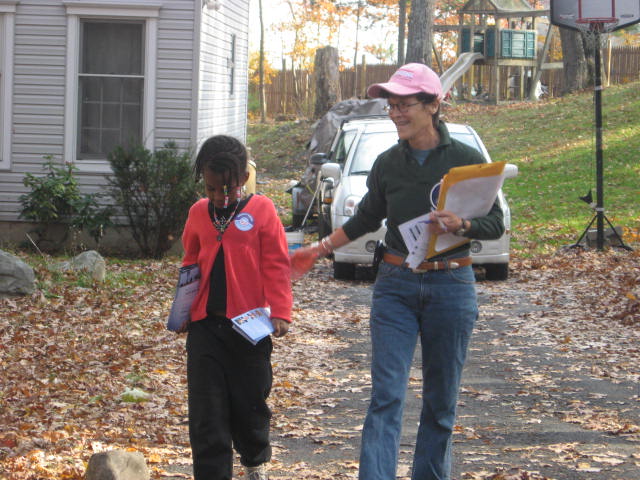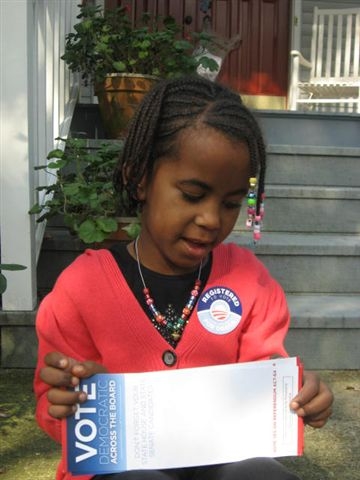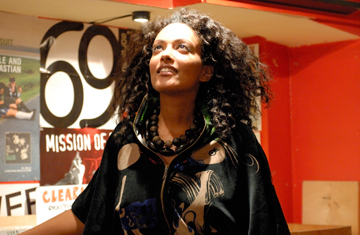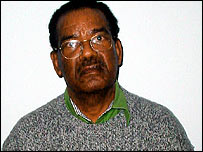Above: Antonia Blumberg, 18, center, enjoys the music at
Virgin Mary Ethiopian Orthodox Church on Compton Avenue.
She’s participating in a USC program called Souljourn that
takes students to different churches around the city to
experience different cultures and beliefs. (Liz O. Baylen /
Los Angeles Times).
Field trip of world religions doesn’t go far
USC’s extracurricular ‘Souljourn’ program lets students study
firsthand how world religions are ‘lived,’ by visiting the dozens
of churches that sit within blocks of campus.
By Joe Mozingo
April 27, 2009
In his quest to have students experience firsthand how people around the world worship, Varun Soni, the dean of religious life at USC, did not start up some expensive study-abroad program. He just ventured a few blocks from campus. Read more.
Related from Tadias Archives:
History of Ethiopian Church Presence in Jerusalem
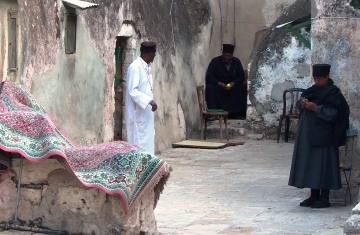
Above photo: Ethiopian monks on the roof of Christianity’s
holiest shrine in Jerusalem (Creative Commons Attribution).
Tadias Magazine
Editor’s Note:
Updated: Tuesday, April 28, 2009
New York (Tadias) – The following piece was first published on the print issue of Tadias Magazine in the context of the July 2002 brawl that erupted on the roof of Christianity’s most holy place between Ethiopian and Egyptian monks.
“Eleven monks were treated in hospital after a fight broke out for control of the roof of the Church of the Holy Sepulchre in Jerusalem, the traditional site of Jesus’s crucifixion, burial and resurrection”, wrote Alan Philps, a Jerusalem based reporter for the Daily Telegraph.
“The fracas involved monks from the Ethiopian Orthodox church and the Coptic church of Egypt, who have been vying for control of the rooftop for centuries.”
We have republished here part of the original article from our archives with a hope that it may generate a healthy discussion on the subject.
Deir Sultan, Ethiopia and the Black World
By Negussay Ayele for Tadias Magazine
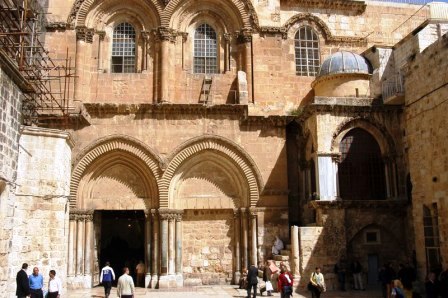
Above: Main entrance to the Church of the Holy Sepulchre (27/03/2005),
Easter Sunday. This image is licensed under Creative Commons Attribution.
Unknown by much of the world, monks and nuns of the Ethiopian Orthodox Church, have for centuries quietly maintained the only presence by black people in one of Christianity’s holiest sites—the Church of the Holy Sepulchre of Jesus Christ in Jerusalem.
Through the vagaries and vicissitudes of millennial history and landlord changes in Jerusalem and the Middle East region, Ethiopian monks have retained their monastic convent in what has come to be known as Deir Sultan or the Monastery of the Sultan for more than a thousand years.
Likewise, others that have their respective presences in the area at different periods include Armenian, Russian, Syrian, Egyptian and Greek Orthodox/Coptic Churches as well as the Holy See.
As one writer put it recently, “For more than 1500 years, the Church of Ethiopia survived in Jerusalem. Its survival has not, in the last resort, been dependent on politics, but on the faith of individual monks that we should look for the vindication of the Church’s presence in Jerusalem…. They are attracted in Jerusalem not by a hope for material gain or comfort, but by faith.”
It is hoped that public discussion on this all-important subject will be joined by individuals and groups from all over the world. We hope that others with more detailed and/or first hand knowledge about the subject will join in the discussion.
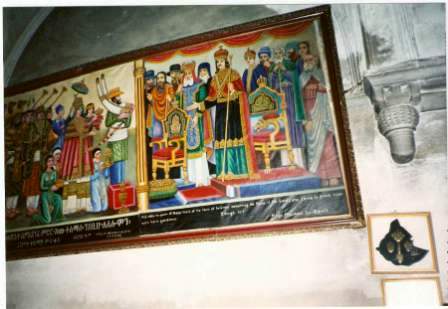
Above: Painting on the wall of the Ethiopian part of the church of the Holy
Sepulcher. Photo by Iweze Davidson.
Accounts of Ethiopian presence in Jerusalem invoke the Bible to establish the origin of Ethiopian presence in Jerusalem.
Accordingly, some Ethiopians refer to the story of the encounter in Jerusalem between Queen of Sheba–believed to have been a ruler in Ethiopia and environs–and King Solomon, cited, for instance, in I Kings 10: 1-13.
According to this version, Ethiopia’s presence in the region was already established about 1000 B.C. possibly through land grant to the visiting Queen, and that later transformation into Ethiopian Orthodox Christian monastery is an extension of that same property.
Others refer to the New Testament account of Acts 8: 26-40 which relates the conversion to Christianity of the envoy of Ethiopia’s Queen Candace (Hendeke) to Jerusalem in the first century A.D., thereby signaling the early phase of Ethiopia’s adoption of Christianity. This event may have led to the probable establishment of a center of worship in Jerusalem for Ethiopian pilgrims, priests, monks and nuns.
Keeping these renditions as a backdrop, what can be said for certain is the following: Ethiopian monastic activities in Jerusalem were observed and reported by contemporary residents and sojourners during the early years of the Christian era.
By the time of the Muslim conquest of Jerusalem and the region (634-644 A.D.) khalif Omar is said to have confirmed Ethiopian physical presence in Jerusalem’s Christian holy places, including the Church of St. Helena, which encompasses the Holy Sepulchre of the Lord Jesus Christ.
His firman or directive of 636 declared “the Iberian and Abyssinian communities remain there” while also recognizing the rights of other Christian communities to make pilgrimages in the Christian holy places of Jerusalem.
Because Jerusalem and the region around it, has been subjected to frequent invasions and changing landlords, stakes in the holy places were often part of the political whims of respective powers that be.
Subsequently, upon their conquest of Jerusalem in 1099, the Crusaders had kicked out Orthodox/Coptic monks from the monasteries and installed Augustine monks instead. However, when in 1187 Salaheddin wrested Jerusalem from the Crusaders, he restored the presence of the Ethiopian and other Orthodox/Coptic monks in the holy places.
When political powers were not playing havoc with their claims to the holy places, the different Christian sects would often carry on their own internecine conflicts among themselves, at times with violent results.
Contemporary records and reports indicate that the Ethiopian presence in the holy places in Jerusalem was rather much more substantial throughout much of the period up to the 18th and 19th centuries.
For example, an Italian pilgrim, Barbore Morsini, is cited as having written in 1614 that “the Chapels of St. Mary of Golgotha and of St. Paul…the grotto of David on Mount Sion and an altar at Bethlehem…” among others were in the possession of the Ethiopians.
From the 16th to the middle of the 19th centuries, virtually the whole of the Middle East was under the suzerainty of the Ottoman Empire. When one of the Zagwe kings in Ethiopia, King Lalibela (1190-1225), had trouble maintaining unhampered contacts with the monks in Jerusalem, he decided to build a new Jerusalem in his land. In the process he left behind one of the true architectural wonders known as the Rock-hewn Churches of Lalibela.
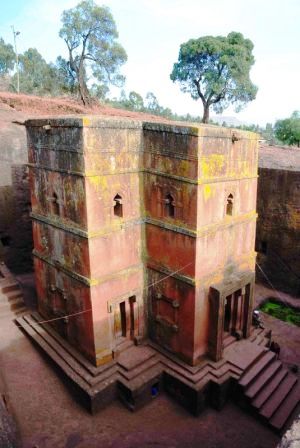
Above: Lalibela. This image is licensed under
Creative Commons Attribution.

Above: Lalibela. This image is licensed under Creative Commons Attribution.
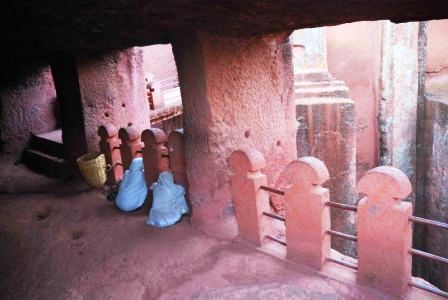
Above: Lalibela. This image is licensed under Creative Commons Attribution.
The Ottomans also controlled Egypt and much of the Red Sea littoral and thereby circumscribed Christian Ethiopia’s communication with the outside world, including Jerusalem.
Besides, they had also tried but failed to subdue Ethiopia altogether. Though Ethiopia’s independent existence was continuously under duress not only from the Ottomans but also their colonial surrogate, Egypt as well as from the dervishes in the Sudan, the Ethiopian monastery somehow survived during this period. Whenever they could, Ethiopian rulers and other personages as well as church establishments sent subsidies and even bought plots of land where in time churches and residential buildings for Ethiopian pilgrims were built in and around Jerusalem. Church leaders in Jerusalem often represented the Ethiopian Orthodox Church in ecumenical councils and meetings in Florence and other fora.
During the 16th and 17th centuries the Ottoman rulers of the region including Palestine and, of course, Jerusalem, tried to stabilize the continuing clamor and bickering among the Christian sects claiming sites in the Christian holy places. To that effect, Ottoman rulers including Sultan Selim I (1512-1520) and Suleiman “the Magnificent” (1520-1566) as well as later ones in the 19th century, issued edicts or firmans regulating and detailing by name which group of monks would be housed where and the protocol governing their respective religious ceremonies. These edicts are called firmans of the Status Quo for all Christian claimants in Jerusalem’s holy places including the Church of the Holy Sepulchre, which came to be called Deir Sultan or the monastery (place) of the Sultan.
Ethiopians referred to it endearingly as Debre Sultan. Most observers of the scene in the latter part of the 19th Century as well as honest spokesmen for some of the sects attest to the fact that from time immemorial the Ethiopian monks had pride of place in the Church of the Holy Sepulchre (Deir Sultan). Despite their meager existence and pressures from fellow monks from other countries, the Ethiopian monks survived through the difficult periods their country was going through such as the period of feudal autarchy (1769-1855).
Still, in every document or reference since the opening of the Christian era, Ethiopia and Ethiopian monks have been mentioned in connection with Christian holy places in Jerusalem, by all alternating landlords and powers that be in the region.
As surrogates of the weakening Ottomans, the Egyptians were temporarily in control of Jerusalem (1831-1840). It was at this time, in 1838, that a plague is said to have occurred in the holy places, which in some mysterious ways of Byzantine proportions, claimed the lives of all Ethiopian monks.
The Ethiopians at this time were ensconced in a chapel of the Church of the Holy Sepulchre (Deir Sultan) as well as in other locales nearby. Immediately thereafter, the Egyptian authorities gave the keys of the Church to the Egyptian Coptic monks.
The Egyptian ruler, Ibrahim Pasha, then ordered that all thousands of very precious Ethiopian holy books and documents, including historical and ecclesiastical materials related to property deeds and rights, be burned—alleging conveniently that the plague was spawned by the Ethiopian parchments.
Monasteries are traditionally important hubs of learning and, given its location and its opportunity for interaction with the wider family of Christendom, the Ethiopian monastery in Jerusalem was even more so than others. That is how Ethiopians lost their choice possession in Deir Sultan.
By the time other monks arrived in Jerusalem, the Copts claimed their squatter’s rights, the new Ethiopian arrivals were eventually pushed off onto the open rooftop of the church, thanks largely to the machinations of the Egyptian Coptic church.
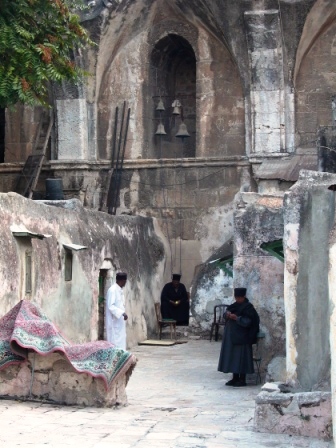
Above: The roof of the Church of the Holy Sepulchre in
Jerusalem, where Ethiopians maintain the only presence
by black people in Christianity’s holiest shrine. This image
is licensed under Creative Commons Attribution.
Although efforts on behalf of Ethiopian monks in Jerusalem started in mid-19th Century with Ras Ali and Dejach Wube, it was the rise of Emperor Tewodros in 1855 in Ethiopia that put the Jerusalem monastery issue back onto international focus.
When Ethiopian monks numbering a hundred or so congregated in Jerusalem at the time, the Armenians had assumed superiority in the holy places. The Anglican bishop in Jerusalem then, Bishop Samuel Gobat witnessed the unholy attitude and behavior of the Armenians and the Copts towards their fellow Christian Ethiopians who were trying to reclaim their rights to the holy places in Jerusalem.
He wrote that the Ethiopian monks, nuns and pilgrims “were both intelligent and respectable, yet they were treated like slaves, or rather like beasts by the Copts and the Armenians combined…(the Ethiopians) could never enter their own chapel but when it pleased the Armenians to open it. …On one occasion, they could not get their chapel opened to perform funeral service for one of their members. The key to their convent being in the hands of their oppressors, they were locked up in their convent in the evening until it pleased their Coptic jailer to open it in the morning, so that in any severe attacks of illness, which are frequent there, they had no means of going out to call a physician.’’
It was awareness of such indignities suffered by Ethiopian monks in Jerusalem that is said to have impelled Emperor Tewodros to have visions of clearing the path between his domain and Jerusalem from Turkish/Egyptian control, and establishing something more than monastic presence there. In the event, one of the issues that contributed to the clash with British colonialists that consumed his life 1868, was the quest for adequate protection of the Ethiopian monks and their monastery in Jerusalem.
Emperor Yohannes IV (1872-1889), the priestly warrior king, used his relatively cordial relations with the British who were holding sway in the region then, to make representations on behalf of the Ethiopian monastery in Jerusalem.
He carried on regular pen-pal communications with the monks even before he became Emperor. He sent them money, he counseled them and he always asked them to pray for him and the country, saying, “For the prayers of the righteous help and serve in all matters. By the prayers of the righteous a country is saved.”
He used some war booty from his battles with Ottomans and their Egyptian surrogates, to buy land and started to build a church in Jerusalem. As he died fighting Sudanese/Dervish expansionists in 1889, his successor, Emperor Menelik completed the construction of the Church named Debre Gennet located on what was called “Ethiopian Street.”
During this period more monasteries, churches and residences were also built by Empresses Tayitu, Zewditu, Menen as well as by several other personages including Afe Negus Nessibu, Dejazmach Balcha, Woizeros Amarech Walelu, Beyenech Gebru, Altayeworq.
As of the end of the 19th and the beginning of the 20th Century the numbers of Ethiopian monks and nuns increased and so did overall Ethiopian pilgrimage and presence in Jerusalem.
In 1903, Emperor Menelik put $200, 000 thalers in a (Credileone) Bank in the region and ordained that interests from that savings be used exclusively as subsidy for the sustenance of the Ethiopian monks and nuns and the upkeep of Deir Sultan. Emperor Menelik’s 6-point edict also ordained that no one be allowed to draw from the capital in whole or in part.
Land was also purchased at various localities and a number of personalities including Empress Tayitu, and later Empress Menen, built churches there. British authorities supported a study on the history of the issue since at least the time of kalifa (Calif) Omar ((636) and correspondences and firmans and reaffirmations of Ethiopian rights in 1852, in an effort to resolve the chronic problems of conflicting claims to the holy sites in Jerusalem.
The 1925 study concluded that ”the Abyssinian (Ethiopian ) community in Palestine ought to be considered the only possessor of the convent Deir Es Sultan at Jerusalem with the Chapels which are there and the free and exclusive use of the doors which give entrance to the convent, the free use of the keys being understood.”
Until the Fascist invasion of Ethiopia in the 1930’s when Mussolini confiscated Ethiopian accounts and possessions everywhere, including in Jerusalem, the Ethiopian presence in Jerusalem had shown some semblance of stability and security, despite continuing intrigues by Copts, Armenians and their overlords in the region.
This was a most difficult and trying time for the Ethiopian monks in Jerusalem who were confronted with a situation never experienced in the country’s history, namely its occupation by a foreign power. And, just like some of their compatriots including Church leaders at home, some paid allegiance to the Fascist rulers albeit for the brief (1936-1941) interregnum.
Emperor Haile Sellassie was also a notable patron of the monastery cause, and the only monarch to have made several trips to Jerusalem, including en route to his self-exile to London in May, 1936.
Since at least the 1950s there was an Ethiopian Association for Jerusalem in Addis Ababa that coordinated annual Easter pilgrimages to Jerusalem. Hundreds of Ethiopians and other persons from Ethiopia and the Diaspora took advantage of its good offices to go there for absolution, supplication or felicitation, and the practice continues today.
Against all odds, historical, ecclesiastical and cultural bonding between Ethiopia and Jerusalem waxed over the years. The Ethiopian presence expanded beyond Deir Sultan including also numerous Ethiopian Churches, chapels, convents and properties. This condition required that the Patriarchate of the Ethiopian Orthodox Church designate Jerusalem as a major diocese to be administered under its own Archbishop.
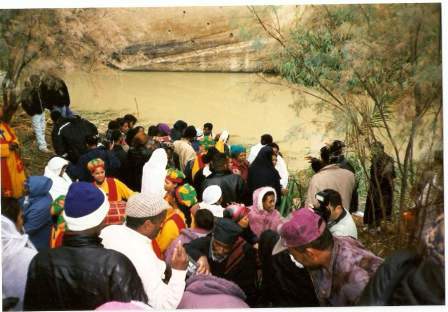
Above: Timket (epiphany) celebration by the Ethiopian Orthodox Tewahedo
Church on the Jordan River, considered to be the place where Jesus was
baptized. Jan. 1999. Photo by Iweze Davidson.
Ethiopia and Black Heritage In Jerusalem
For hundreds of years, the name or concept of Ethiopia has been a beacon for black/African identity liberty and dignity throughout the diaspora. The Biblical (Psalm 68:31) verse , “…Ethiopia shall soon stretch forth her hands unto God” has been universally taken to mean African people, black people at large, stretch out their hands to God (and only to God) in supplication, in felicitation or in absolution.
As Daniel Thwaite put it, for the Black man Ethiopia was always “…an incarnation of African independence.”
And today, Ethiopian monastic presence in the Church of the Holy Sepulchre or Deir Sultan in Jerusalem, is the only Black presence in the holiest place on earth for Christians. For much of its history, Ethiopian Christianity was largely hemmed in by alternating powers in the region. Likewise, Ethiopia used its own indigenous Ethiopic languages for liturgical and other purposes within its own territorial confines, instead of colonial or other lingua franca used in extended geographical spaces of the globe.
For these and other reasons, Ethiopia was not able to communicate effectively with the wider Black world in the past. Given the fact that until recently, most of the Black world within Africa and in the diaspora was also under colonial tutelage or under slavery, it was not easy to appreciate the significance of Ethiopian presence in Jerusalem. Consequently, even though Ethiopian/Black presence in Jerusalem has been maintained through untold sacrifices for centuries, the rest of the Black world outside of Ethiopia has not taken part in its blessings through pilgrimages to the holy sites and thereby develop concomitant bonding with the Ethiopian monastery in Jerusalem.
For nearly two millennia now, the Ethiopian Church and its adherent monks and priests have miraculously maintained custodianship of Deir Sultan, suffering through and surviving all the struggles we have glanced at in these pages. In fact, the survival of Ethiopian/Black presence in Christianity’s holy places in Jerusalem is matched only by the “Survival Ethiopian Independence” itself.
Indeed, Ethiopian presence in Deir Sultan represents not just Ethiopian Orthodox Christianity but all African/black Christians of all denominations who value the sacred legacy that the holy places of Jerusalem represent for Christians everywhere. It represents also the affirmation of the fact that Jerusalem is the birthplace of Christianity, just as adherents of Judaism and Islam claim it also.
The Ethiopian foothold at the rooftop of the Church of the Holy Sepulchre is the only form of Black presence in Christianity’s holy places of Jerusalem. It ought to be secure, hallowed and sanctified ground by and for all Black folks everywhere who value it. The saga of Deir Sultan also represents part of Ethiopian history and culture. And that too is part of African/black history and culture regardless of religious orientation.
When a few years ago, an Ethiopian monk was asked by a writer why he had come to Jerusalem to face all the daily vicissitudes and indignities, he answered, “because it is Jerusalem.”
—
About the Author:
Dr. Negussay Ayele is a noted Ethiopian scholar. He is the author of the book Ethiopia and the United States, Volume I, the Season of Courtship, among many other publications. He lives in Los Angeles, California.

